
In many ways, by virtue of necessity, in-house counsel have always needed to be more innovative than their private practice peers. Whether they are working solo or in a large department, the nature of in-house life is the constant demand to do more with less and find ways to be increasingly more involved in working with the business units while at the same time controlling costs.
That kind of thinking and action requires a certain entrepreneurial spirit — one that is interested in changing the way things are done to make way for new work that demands greater attention.
But so often in-house counsel and the efforts of their teams go unnoticed. Our motivation last year to launch Innovatio — an in-house awards program that would highlight the innovative work of legal departments and their legal service provider partners — was largely due to a desire to bring to light the kind of game-changing work taking place in-house.
When the nominations started coming in I was consistently impressed — whether from a small or large department — by the projects being put forward but also by the level of interest we received.
As Jane Fedoretz, one of our judges, noted after reviewing some of the nominations: “I was struck by the fact in-house lawyers take significant steps to add value and be creative (when given the opportunity) relative to the companies they work for. All of the candidates demonstrated a keen interest in making things better by taking initiative with these projects and should be commended for their integrity and obvious leadership.”
She noted that in-house lawyers often “lead from behind” by recognizing gaps in business processes and then take on extra work to remediate the gaps, but often don’t receive credit for their transformational leadership.
That, Jane told me, is why the awards are so important. We hope you agree.
The following pages tell the stories of the winners as chosen by our panel of general counsel judges from across the country. Please read their profiles and perhaps they will serve as inspiration for your own projects in the year ahead.
We hope it will also inspire you to consider putting forward a nomination for Innovatio later this fall. I look forward to hearing from you!
{module 10255}
RBC leverages Lean Six Sigma to net savings, enhance revenue
- Category:Law Department Management
- Department Size:Large
- Company:RBC

RBC defines innovation as “connecting what’s possible to what’s valuable to our clients, our shareholders and our employees.” With that in mind, the general counsel group embarked on an ambitious program to derive greater value for these stakeholder groups using Lean Six Sigma.
While a recognized risk, RBC believed the formalized LSS methodology, not traditionally used in law departments, could be a particularly good match with the skills of its legal talent. Following the disciplined LSS program, RBC lawyers and other legal professionals were asked to challenge their standard procedures and identify creative alternatives to eliminate low-value-adding work and to improve the efficiency of how it delivers legal services to internal business partners and clients.
RBC ultimately settled on 16 discrete projects of which 14 have been completed to date. The benefits include financial, as well as team engagement and empowerment, which strengthen the legal department and the enterprise as a whole. Two projects that are representative of the LSS initiatives are:
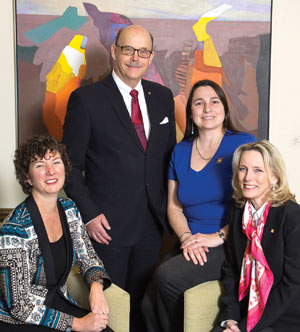
- Emily Jelich
- David Aylward
- Angelique Rebelo
- Lucie Gauvin
Structured Notes — The LSS legal team identified low-value-adding activities in its current legal processes and seized the opportunity to create a solution that eliminated them. The solution involves leveraging automated documentation technology to support the legal team’s ability to efficiently deliver its services to the business partners. Annually, this process reduces external legal costs by over $100,000; reduces the risk of error; and liberates almost 1,000 hours of internal legal time which can be re-deployed. In addition, there is an expected enhancement to the revenue stream in excess of $1 million annually.
Provision Report Project — GCG members collaborated with finance colleagues and devised a streamlined process for reporting funds provisioned for settlements. Annually, the revised process frees up 100 hours. More importantly, the project reduces the risk of error and the probability of over or under provisioning.
“As with most ventures in innovation there was no certainty at the outset that our efforts would be successful. However, upon conclusion we believe that we have been richly rewarded through the initiative,” stated David Aylward, senior business manager, law, corporate secretary, taxation at RBC.
As a result of the various LSS projects implemented in 2013, GCG has been able to liberate 2,700 hours of internal time annually; save and avoid costs of just under $1 million; and enhance the revenue stream by over $1 million (this from a unit that is normally not revenue-generating).
Each of the 16 individual projects had a leader and a separate team, with the total number of legal staff involved approaching 70 across all projects.
The judges ultimately felt the RBC initiative was the clear winner for Innovation of the Year.
“It’s not easy to import LSS into a legal department,” said Dorothy Quann, general counsel of Xerox Canada. “These projects really create WOW factor on successful implementation using LSS methodology, generating revenue of $1 million, and saving $100,000 in costs. Truly innovative!”
“To make LSS work in a legal department requires a fair amount of creativity to determine how best to apply the methodology in such a way that actually makes it worthwhile and RBC has demonstrated that they have successfully and innovatively introduced this methodology,” said Robert Piasentin, general counsel, Sierra Systems.
Homegrown management tool nets TVO cost savings and efficiencies
- Category:Law Department Management
- Department Size:Small
- Company:TVO Ontario
Last year TV Ontario’s legal services and business affairs department launched its Content and Program Rights system. CPR is TVO’s homegrown rights management system built in-house involving the input of the legal department, content and programming and information technology departments.
The innovation lies in creating and using new technology for tracking media content deals from development stage to contracting and then to mass distribution. The CPR system enabled all affected departments to perform work quickly and seamlessly. Moving away from endless status update meetings, phone calls, and excess e-mails, the new CPR system ensured the legal department and its client groups were coordinated and updated in real time. Consequently, the legal department became efficient, focused on value-add activities instead of “administrivia.”
“CPR has not only enabled TVO to track its content rights, but more importantly in this time of evolving technologies and multiple screens, it has given TVO the ability to have authorized staff access customized reports 24/7, so they can determine what content we can exploit where, when and how,” says Mark Le Blanc, general counsel at TVO. “CPR has moved TVO from having a rights database, to a 24/7 customizable reporting tool. Furthermore, it is tailored to the needs of the Canadian marketplace, taking into account such factors as tracking Canada Media Fund commitments.”
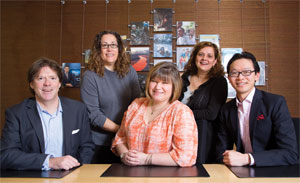
- Mark Le Blanc
- Mara Tranmontin
- Marj Cromb
- Osnat Sitbon
- Jonathan Lau
TVO, which is Ontario’s not-for-profit public education media organization, needed a new rights management system that would reflect the diverse and complex nature of new media deals. The existing system was slow, outdated, and inflexible to handle the input of new rights. The new CPR can properly capture the data and be adapted for recording future rights that do not yet exist.
Savings resulted in reducing overtime so the team could focus on the essential tasks like contracting and negotiating deals. There were also savings by using the IT team to develop the CPR system in-house which met the organization’s needs more than off-the-shelf software could.
The CPR system enabled other departments to know the status of a media deal in real time. The revenue team can also access the system as they can then see which media titles can be sub-licensed, based on the rights.
{module 10255}
Cisco brings external resources in-house
- Category:Working with External Counsel
- Department Size:Large
- Company:CISCO Systems Inc.
Cisco Systems Inc. has always been about collaboration — it’s the basis of what the company does and so it seeks out, and works with, partners who support its business values.
In 2012, Cisco Canada was confronted with a familiar challenge — staffing its in-house legal team beyond the complement of three lawyers in Canada serving. With more than 250 lawyers globally, the team in Canada can obtain help internally and externally but needed additional support day-to-day in-house.
The challenge was to develop a long-term sustainable relationship with a group of experienced lawyers who were willing to work on an embedded basis inside the business.

- Simmi Chacko, Cisco; Sean Caragata, Cisco
- Claudia Cavacece, Cisco; Rajiv Arya, Conduit, working for Cisco team
- Peter Carayiannis, Conduit - president & founder; Julia Hickey (on monitor)
- Beth Anderson, Conduit, working for Cisco team
- Constance Crosby, Cisco; Lynn Silkauskas, Cisco
Julia Hickey was the principal lawyer at Cisco who conceived of, and initiated, the new approach for legal services in Canada.
“We wanted to build a stable bench for overflow support and additional support for maternity leaves and other types of coverage,” says Hickey, director of legal services based in Herndon, Va. “We were looking to find other types of resources to help augment our team.”
Cost was also an issue. Enter Conduit Law Professional Corp. Hickey says Conduit took the time to understand the business strategies and goals of Cisco. “The team they proposed to us had Bay Street experience but also understood the in-house experience and had worked in departments similar to ours,” she says.
Their fees are based on a fixed monthy fee for one of the lawyers who is embedded in the Cisco department in Toronto. The other lawyer provides a flexible number of hours per week with a set number of hours per month.
The solution put in place was to have Beth Anderson and Rajiv Arya at Cisco. Both have big firm and in-house experience, focused exclusively on the needs of global technology solution providers. Cisco enjoys a broad range of services from the Conduit team but all services are delivered via a flat monthly fee. Cisco continues to engage traditional law firms for other work. In terms of cost savings Cisco has calculated that it is enjoying a discount of two-thirds from the market rate of Bay Street lawyers of a “similar vintage and pedigree.”
HIROC and BLG score with alternative fee arrangement
- Category:Working with External Counsel
- Department Size:Small
- Company:Health Insurance Reciprocal of Canada
The Health Insurance Reciprocal of Canada embarked upon a pricing arrangement with Borden Ladner Gervais LLP, for litigation services in the medical malpractice field.
The agreement is based on a new configuration of business fundamentals. These include a volume of work measured by the number of matters for each class of matter rather than by hours, a degree of in-sourcing to the HIROC legal team, rigorous use of legal project management for intermediate to highly complex matters, and a fee arrangement consisting of a base amount together with a meaningful amount for performance.
HIROC and BLG agreed to use weighted key performance indicators including: Understands objectives/expectations (10 per cent), responsiveness/communications (10 per cent), efficiency/process management (10 per cent), predictable cost/budgeting skills (15 per cent), legal expertise at the appropriate level (20 per cent), and results delivered/execution (35 per cent). Each KPI has measurements in place. HIROC scores BLG globally (not on every matter) on the first three KPIs every six months, using a three-point scale of exceeds, meets, and did not meet. The last three KPIs are scored on every Class 4 and Class 5 matter every six months.
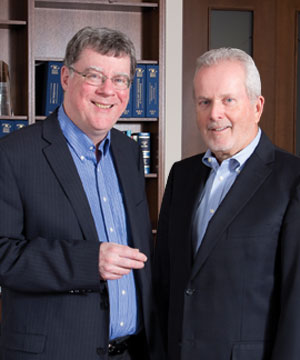
- Michael J. Boyce, vice president claims, Health Insurance Reciprocal of Canada (The HIROC Group)
- John J. Morris, Borden Ladner Gervais LLP, partner and national leader of the health law group
There is a 15 per cent performance fee built into the base fee. Depending on the performance, the performance fee is released if the result is “meets”; doubled and paid if the result is “exceeds”; or subtracted from the base fee if the result is “did not meet.” A comprehensive performance debrief is conducted every six months. Recently, Catalyst Consulting offered suggestions on how to improve the performance evaluation process which came into effect in 2013. HIROC wanted to have more cost certainty for its legal spend, while ensuring highest quality of the legal services provided. HIROC sought a way to link its legal costs to case volumes as opposed to the traditional approach of hours spent. It wanted increased predictability of legal fees and sought a new approach to pricing its work with this objective in mind.
The outcomes have been a reduction in legal costs of over 20 per cent, improved budget predictability, clarity in the categorization of matters by complexity, and more proficiency in legal project management.
The key results were a reduction in legal costs — a combination of insourcing and pricing for the six-year reference period will save about 23 per cent over the life of the agreement. It will also mean improved budget predictability.
{module 10255}
The Keg cooks up a successful risk management strategy
- Category:Risk Management
- Department Size:Large
- Company:The Keg
The Keg Steakhouse & Bar might be best known for its tender steaks and slow-roasted prime rib, but it’s also being recognized for its work in risk management.
Since 2006, Catherine Chow has been The Keg’s sole in-house counsel, responsible for the management of legal matters in more than 100 locations across North America. Together with a hand-picked network of external counsel, Chow navigates the risks presented by the business activities of the stakeholders she interacts with on a daily basis.
The Keg’s legal department is responsible for managing a full portfolio of legal activities including real estate and leasing, new business development, franchising, financing, insurance, licensing, litigation, corporate compliance, trademarks, and material contracts.

- Catherine Chow, director of legal services, The Keg
In 2013, The Keg made a decision to consolidate all of its insurance under a single carrier, and Chow led the negotiations for its corporate and franchised locations across Canada and the U.S.
Building upon The Keg’s existing risk management program, Chow initiated the development of a company-wide risk management web page, allowing the company to inform, educate, and engage all levels of employees, managers, and franchisees to take an active role in creating a safer workplace.
As a result, the company expects to enhance and measure its guest and employee experiences through proactive risk controls and best practices to reduce insurance claims. This proactive approach has led to a better overall quality of operations, and has also allowed the company to negotiate significant improvements to its insurance program, contributing directly to the bottom line.
“We selected Catherine Chow and The Keg, as she clearly met the award criteria of taking a lead role in a risk management initiative at The Keg. Ms. Chow initiated a company-wide risk management web page for all employees and over 100 franchisees to create safer workplaces,” says Dorothy Quann, general counsel with Xerox Canada, who judged this category along with Simon Fish, EVP and general counsel of BMO, and Fernando Garcia, general counsel of Nissan Canada. “The jury was impressed that this web program has had measurable results with an improved record of risk control and a reduction in insurance claims,” says Quann.
The Keg views risk management as a continuum of best practices that leads to better guest experiences and workplaces. Fewer accidents or inconveniences (such as injuries or equipment failure) and better risk planning make for efficacious operations.
{module 10255}
Compliance project brings clarity, cohesiveness to BMO
- Category:Compliance
- Department Size:Large
- Company:BMO Financial Group
In 2013 BMO Corporate Compliance rolled out an enterprise-wide governance risk and compliance tool.
The technology (Thomson Reuters Accelus Compliance Manager tool) leverages all core compliance activities including the centralized library of regulatory requirements for the enterprise, performing risk assessments, managing and tracking issues, and monitoring and testing.
Information in the solution serves as the book of record for all of these functions.
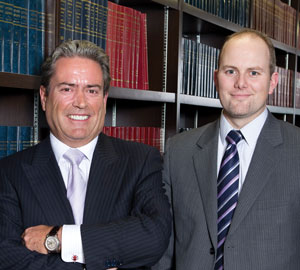
- Mark Moody, vice president, corporate compliance & chief privacy officer
- Nicholas Bray, senior manager, compliance infrastructure
Outside of compliance, the tool will be used by the lines of business across BMO to assist with the management of their regulatory risk, including identifying issues in a timely fashion. Compliance staff have near real-time insight into emerging issues, the ability to effectively assess the issue’s potential impact, and develop action plans for the business.
“As the implementation of the solution progressed across the enterprise, many critical capabilities were expanded,” said Blair Morrison, senior vice president and chief compliance officer at BMO in his nomination of the project.
“For example, analytic capabilities significantly improved as we standardize and structured all of our data — we now have ability to effectively roll up information through our organizational structure.”
This solution has enabled BMO to surge forward with its overall compliance program — automating workflows, streamlining redundant processes, and enhancing data collection and approval processes. The tool allows for clarifying roles, effectively managing regulatory information, and assigning clear accountabilities.
All employees have a central, consistent and credible tool to manage day-to-day and event-based compliance related work.
“Our approach is to have convergence across our corporate functions. As we implemented this solution for all core compliance activities we leveraged the tool beyond Compliance — for example, the regulatory office, the strategy office, and audit,” said Morrison.
The solution will enable the business units and the compliance staff that support them to be confident they are fully up-to-date on regulatory changes.
Automated updates and alerts will remove bottlenecks in the process flow throughout the organization. Leveraging this tool shifts the dynamic from reactionary to proactive management of regulatory change and risk.
BMO has realized several key benefits. Initial investment was reduced significantly by licencing an out of-the-box solution. BMO gained the simplicity of a hosted application while maintaining high levels of security. The company fulfilled tight delivery times and met all expectations.
The standardization and centralization of core compliance data and activities has enabled BMO to identify new and improved metrics to enhance the compliance function. One of the most significant wins for the team has been the way in which the solution has brought previously disparate groups together to focus on a common goal.
Sasol Canada fuels compliance in global operations
- Category:Compliance
- Department Size:Small
- Company:Sasol Canada
Sasol Canada produces liquid fuels and chemicals from coal and natural gas, and aims to build the country’s first gas-to-liquids facility that would convert natural gas into high-quality transportation fuels. But it’s also forward thinking when it comes to compliance.
The Canadian division of Sasol Ltd. has a legal team of two: Sean Ralph, general counsel, and Candice Jones, senior legal counsel. The work being done by Ralph and Jones has helped to establish best practices for the global Sasol organization — and the Canadian division is now considered a global leader within Sasol in areas such as anti-corruption and privacy.
“My selection (in this awards category) is Sasol for several reasons, including that the success was due to efforts of the small team, not just one individual, and that large departments have the resources — both human and capital — to innovate, while the small teams struggle to do with very little,” said Antoinette Bozac, governor of Concordia University, one of the judges in this category.

- Sean Ralph, general counsel
- Candice Jones, senior legal counsel
Ralph and Jones have taken the initiative to review and revise compliance training and materials that were prepared outside of Canada to make them compliant with Canadian laws and regulations.
To date, this compliance project has included review and revision to a number of compliance areas, including privacy matters, human resourcing issues, ethics, occupational health and safety, lobbying, securities laws, and corruption of foreign officials.
Ralph and Jones also deliver monthly compliance reminders to all Canadian employees, which highlight various compliance-related topics, including anti-bribery and corruption, privacy in electronic communications, and problem resolution in the workplace.
These reminders not only highlight key compliance matters, but also help to foster a culture of compliance and create an opportunity for discussion and exploration of the subject matter. The “Canadianized” program also assists ex-patriot workers employed by Sasol to become familiar with the regulatory and legislative requirements in Canada.
The modification of compliance materials for the Canadian division has had a positive impact on the international program by assisting in the development of best practices across Sasol’s workforce of 35,000 in 37 countries.
“Candice and Sean have been innovative in developing programs and practices in areas that are required by Canadian law such as anti-corruption and privacy, but interpreting them in a way that makes them relevant, applicable, and central to how the global organization conducts its business,” says Courtney Burton, an associate with Dentons Canada LLP, who nominated them for the award. “They have led a process of identifying and streamlining global best practices for Sasol and have been at the forefront within the organization related to legal compliance and risk management.”
{module 10255}
Keeping the deal in-house
- Category:In-House Deals
- Department Size:Small
- Company:Canadian Solar Solutions Inc.
In 2013, Canadian Solar Solutions Inc., a wholly owned subsidiary of Canadian Solar Inc., announced the completion and sale of the first three (of nine) solar power projects contracted to be built and sold to TransCanada.
CSSI, based in Guelph, Ont., provides engineering, procurement and construction services and continues to provide operations and maintenance services to the plants once completed as part of their strategy.
The first sale, for Brockville 1 (a 10 megawatt AC solar power valued at over $55 million), was completed in July 2013. In October, CSSI announced the sale of Brockville 2 and Burritts Rapids to TransCanada, a further 16 megawatt AC solar power and a combined value of over $95 million. The value of all nine projects, once completed and sold to TransCanada, is estimated at $470 million.

- John Marner, legal services
- James Gittens, legal manager
Over the last 12 months, the legal team for CSI has also been instrumental in closing the purchase of four projects from SunEdison, two of which have been subsequently repackaged and sold to other investors as turnkey operations much like the TransCanada deal. They have also signed contractual commitments to sell another 13 projects to end buyers, while retaining the engineering, procurement and construction contracts and operations and management contracts for those projects.
“I’ve always tried to keep as much as possible in-house — it’s always been my goal to keep legal costs down and only use external counsel where absolutely necessary,” says John Marner, director, legal services with Canadian Solar. “As a public company we’re under pressure to get projects done by the end of each quarter of each year so getting them done efficiently is extremely important to us.”
Their legal team (consisting of only two in-house lawyers) manages all the EPC and O&M agreements and supplier agreements in-house, and works with selected external counsel to manage all other contracts as required.
The team has developed a streamlined methodology for putting deals together by developing extremely close working relationships with both their commercial and finance teams.
This focus on highest and best use of the in-house legal resources in association with a cost-effective use of external counsel has enhanced the management of CSI’s legal budget over a highly active period of business transactions.
“Because there was so much complexity to it we needed someone with more experience than I did on large scale construction projects,” says Marner. “Dan Ferguson at WeirFoulds LLP came into play and was critical in this particular project.
“We want the right people on these files and we will always insist on putting a senior person on the file only where it’s necessary.”
{module 10255}
3M Canada kick-starts immigrants’ new law careers
- Category:Diversity
- Department Size:Small
- Company:3M Canada
As part of a global company with a wide range of product lines, 3M Canada appreciates having people with different perspectives on its staff. That’s why at 3M Canada’s London, Ont., headquarters, the legal affairs team partners with a local organization to help immigrants who have legal skills get the experience they need to work in this country.
3M Canada’s chief privacy officer and legal counsel Ali Haidar, legal affairs director Blair Fantillo, legal counsel Tiffany Koch, and law clerk Christina Hewitt were singled out for their teamwork in the category of Diversity, small departments.
For the last 20 years, 3M Canada has worked with WIL Employment Connections, a London-based not-for-profit organization that helps immigrants prepare for jobs in Canada, and partners with employers to match talented individuals with workplaces.
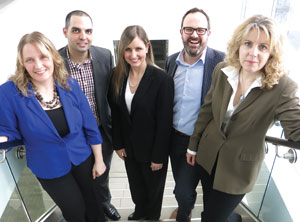
- Christina Hewitt, law clerk
- Ali Haidar, legal counsel & chief privacy officer
- Tiffany Koch, legal counsel
- Blair Fantillo, director, legal affairs
- Carol Ernest, law clerk
Through its partnership with WIL, 3M Canada invites legal experts new to the country to fill eight-week positions within the company’s legal affairs department. “Our participation in the WIL program . . . has provided the participants with relevant legal experience they may not have otherwise been able to obtain,” Haidar says. The partnership has “also allowed [WIL clients] to gain a better understanding of the nature of the legal profession in Canada.”
Haider’s colleague Fantillo concurs. “By all accounts, the placements have been a resounding success and we look forward to continuing this partnership,” he says.
Fantillo explains 3M Canada has facilitated more than 100 placements. “Some of those candidates have successfully made the transition to full-time employment with the company,” he says.
Everyone on the 3M Canada legal team plays a role. Hewitt coordinates, trains, and supervises the WIL placements. Fantillo, Haidar, and Koch interview the prospective participants, assign daily tasks, and provide overall program supervision.
The initiative benefits 3M as well as the WIL clients. The legal affairs team members gain valuable opinions and input on processes. As well, team members who wouldn’t normally play supervisory roles have the opportunity to learn the management ropes. Of course, the legal affairs group also benefits from the additional staff: work is completed more quickly with help from the WIL clients.
“As a result of the many positive experiences we’ve had with WIL Employment Connections, we continue to participate in many ways,” Fantillo says. “We help newcomers gain business experience in Canada relevant to their career path, as well as offer mentorship by our employees.”
BMO inspires external counsel to hire for diversity
- Category:Diversity
- Department Size:Large
- Company:BMO Financial Group
BMO Financial Group is taking its drive for diversity beyond its own staff. When choosing external counsel, the institution’s Legal Corporate and Compliance Group asks suppliers to disclose diversity statistics about associates, partners, and managers. The LCCG then uses that information when evaluating suppliers to ensure external counsel is as attuned to diversity as BMO is.
This initiative led the Innovatio judges to select BMO for the Diversity, large departments awards.
The award reflects the leadership of the LCCG’s newly minted diversity council, which helps ensure BMO’s employees and suppliers reflect the communities in which the institution does business. The council consists of Bindu Dhaliwal, associate general counsel, corporate affairs, Abas Kanu, senior counsel, and Neil Puddicombe, associate general counsel, corporate affairs.
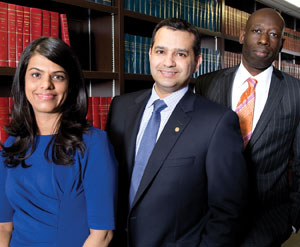
- Bindu Dhaliwal, associate general counsel
- Neil Puddicombe, associate general counsel and director of subsidiary guidance
- Abas Kanu, senior counsel
Clearly, diversity is a key priority, but it doesn’t trump all else when the LCCG selects suppliers. “Skills and capabilities are at the forefront,” says Dhaliwal. “We deal with top-tier law firms across the country. We believe those firms won’t hire people who don’t have the skillset to do the work. From our point of view, once you have the pool of people who are qualified, you should have diversity among that group.”
In BMO’s case, getting started wasn’t easy. At first, legal suppliers struggled to provide diversity statistics, because they didn’t have voluntary employee-disclosure systems. Nonetheless, the LCCG persisted and encouraged suppliers to obtain consent from their employees. “A number of our legal suppliers have responded positively, saying that LCCG’s request for diversity statistics prompted their firms to examine their practices and address the issue of measurement,” BMO said in its nomination.This program has BMO’s suppliers talking and acting. “By putting diversity measurement on the agenda with its external law firms during its annual reviews, LCCG has challenged the legal community to think about diversity in a way that links it directly to a business case,” the bank says.
The LCCG has gone even further to spread the word about the importance of diversity. The council has explained the supplier-evaluation system to the Law Society of Upper Canada and to colleagues at numerous industry group events. In future, the council plans to advocate that other major Canadian banks make similar disclosure requests of suppliers.
{module 10255}
Recovery program gives students value experience
- Category:Litigation Management
- Department Size:Small
- Company:Manitoba Telecom Services Inc.
It’s easy to see why Candace Bishoff, general counsel director, law, at Manitoba Telecom Services Inc. in Winnipeg, nominated her small in-house legal department for an Innovatio award. They developed a program that collects on otherwise written off bad debt — and gives articling students valuable litigation experience in the process.
Working with MTS’ collections group and utilizing in-house resources, the Delinquent Business Account Collections Program was developed in 2013. It launched in tandem with a program matching the law department with third year law students from the University of Manitoba who were then selected to assist the in-house lawyer overseeing the collections program. Working together with the business groups, the law school students and supervising lawyer were responsible for taking each delinquent account from the first step of the demand letter through to judgment and — ideally — collection.
The partnership was a “win-win” says Bishoff.
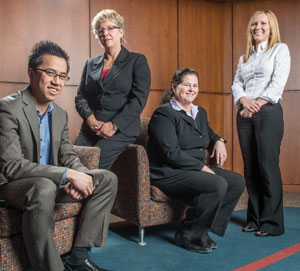
- Stefan Bounket, then articling student, now a first year lawyer with MTS
- Candace Bishoff, general counsel & director Law MTS
- Susanne Dandenault, senior legal counsel MTS
- Sherisse McDeffe, legal assistant MTS
“We provided real-life litigation experience for those students, and used their services as a cost-effective way to supplement this new program,” she explains.
It also helped the law department prove its worth to MTS as every dollar collected through the program goes “right to the company’s bottom line,” Bishoff explains.
While no easy feat, succeeding in getting money back where others have failed might not be as difficult as one might first assume.
“At the outset, there was a lot of frustration as it is near impossible to locate and contact some of the debtors,” Stefan Bounket, one of the articling students from the University of Manitoba Law School who helped with the project, says. “However, once you get over that hurdle, it’s relatively smooth sailing.”
For Bounket it meant drafting demand letters and filing small claims, working closely with the bankruptcies and collections group to get hands on payment history and copies of agreements.
“Some accounts involve some creative thinking as not all have a signed written agreement,” he explains. “As I have had very little litigation experience before now, this project made me very aware of the amount of paperwork that is done ‘behind the scenes.’”
Susanne Dandenault, senior legal counsel and project leader, says after they have located the debtor and the demand letter has been served, they are open to payment arrangements but not all of the customers are willing to pay up. The next step would be to file a claim, the majority of which are small claims, and set a hearing date. Optimally, they receive payment before the hearing date but if not, they obtain a judgment fairly easily. After all their work, if no payments are forthcoming, the next steps can be taken to garnish bank accounts or register judgments against properties.
{module 10255}
Consolidating external law firms nets Superior Plus savings
- Category:Tomorrow’s Leader in Innovation
- Department Size:Small
- Company:Superior Plus Corp.
When Lorne O’Reilly was a securities lawyer at Gowling Lafleur Henderson LLP he had no plans to leave private practice. That is until he received a call from a headhunter in the fall of 2007 who convinced him to consider a position at Calgary-based oil and gas company Pengrowth Energy Corp.
“I had zero interest in changing; I hadn’t thought at all about doing in-house counsel work,” he says, noting he had been focused on securities and M&A law for four years and enjoyed what he was doing.
But after a series of convincing discussions he made the leap to Pengrowth and two years later he took what he had learned and went to Superior Plus Corp.

- Lorne O'Reilly, Superior Plus Corp.
When he joined Superior as associate general counsel, O’Reilly took the initiative to consolidate legal matters and has lead an effort to reduce external legal costs and create efficiencies through the integration of practices in areas such as contract management, claims management, and external counsel retention.
“When I looked at the initial organization Superior Propane alone had probably 35 to 40 different external counsel it used across the country,” he says. “Then we had other subsidiaries in the Superior Plus Group that also had a number of different firms. Some matched, some didn’t. I would call up on one matter and they would send me information and the audit would come back showing they were also handling other matters for some of our other business but didn’t know they were the same,” says O’Reilly. “Starting to work on synergies was an immediate opportunity for cost savings for us.”
O’Reilly admits he “had to take a chance.” It paid off. “We were able to demonstrate success on immediate response times for our internal clients and immediate cost reductions by managing the fact they no longer had to go to external counsel on some things and identifying synergies where they existed, for example, in labour and employment.”
“We were able to leverage the fact that by using one firm, not four different firms, and by using a particular lawyer (after analysis of the billings) we could say this firm has come out as the best player in results and in what they have billed us,” he says.
That involved “persistence over time” says O’Reilly, as many of the business units had strong relationships with their outside counsel. “To win that over we had to demonstrate success and value for them. The great thing is that my boss at the time had said: ‘Find what you can do and go out and do it.’”
60 Second Snapshot
The lawyer:Lorne O’ReillyThe company:Superior Plus Corp.
- • Department size: Two lawyers in Calgary including O’Reilly, three commercial lawyers in Toronto for the chemicals business.
- • Member Association of General Counsel of Alberta (2011 - current).
- • American Bar Association and Business subsection (2011 - current).
- • In-House Counsel Network (2008 - current).
- • Canadian Bar Association, and Southern Alberta subsections (2004 - current).
- • Part of the founding committee for starting the Alberta Chapter of the Association of Corporate Counsel. He is assisting the ACC and its chapter board to promote local and in-person training, networking and professional development that is relevant to in-house counsel in Alberta.
As a result the cost savings have been substantial and the result on success and happiness from the clients themselves has been positive. The reduction in firms has allowed for efficiency.
In his time at Superior Plus O’Reilly’s reduction of legal expenditures today totals almost $1 million dollars, or 20 per cent, as well as consolidation of the number of law firms used by Superior across North America from 68 to 28 firms.
“When I came in there were well over 75 firms,” he says. “Each year we have had greater than 10 per cent reduction in legal spend as a result of internalization of external legal spend and identifying a different strategy on how we wanted to spend what effectively became legal dollars,” says O’Reilly.
Some of the 28 firms who remain on the company’s roster are there because they are working on a file that has been open eight-10 years. “In some cases we found it was not beneficial to continue the relationship with that firm and in other circumstances the firm was excellent but we found leverage in that they didn’t have offices in B.C. or Alberta and in trying to ensure consistency many areas require a national and consistent approach,” he says.
The reduction of firms allowed for “tremendous efficiency” as well as leveraging of “costs and benefits.”
O’Reilly credits “slow persistence over time” because many of the business units had strong relationships with their external counsel.
But the reduction in number of firms used has resulted in greater control of the legal expertise provided to Superior, and the responsiveness to client matters for issues that require provision to external counsel.
O’Reilly has also led the development and implementation of new governance and employment policies and practices as well as advising on compliance training initiatives.
After reviewing the existing governance policies, O’Reilly took the initiative to revise and update the governing policies for the Superior Plus organization, as well as assist the human resources group with their employment policies. A new code of business conduct & ethics was implemented, with corresponding training processes, and he introduced an anti-corruption policy and privacy policy to address areas of new focus for regulators and shareholder advisors. These policies have addressed a number of best practices in conduct expected throughout the organization.
In a similar vein, O’Reilly revised and updated the standard form agreements used by the Superior Propane and Superior Gas Liquids organization, including plain language modifications for clarity and simplicity in negotiation. These amendments also allowed for presentation to sales personnel to assist in their understanding of the agreements. Now, only those matters that require material change from the standard form require review (which has led to a reduction in requests from the business clients).
“Once you are in-house you’re not just a lawyer, you are a businessperson who has legal expertise,” says O’Reilly. “The idea was to use that experience to provide value to allow people to have comfort.”







